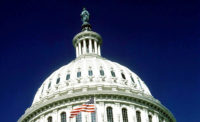AHA blasts California bill that blocks new sugary drink taxes

The American Heart Association (AHA) is sharply critical of a bill passed last week in California that prevents local communities in the state from adopting any new local sugary drink taxes for the next 12 years. The AHA calls Assembly Bill 1838 “a last-minute, backroom deal negotiated and written in secret by beverage industry lobbyists and their allies” and warns that it is a significant step backwards in the ongoing effort to reduce overconsumption of sugary drinks.
“This is one of the worst pieces of legislation I have seen in more than 30 years spent fighting for better health for kids and families,” said Nancy Brown, AHA CEO. “We could not be more disappointed to see this bill, taken straight from the tobacco industry playbook, pass and will urge Governor Brown to veto this appalling legislation.”
Three California cities have already acted
Residents of Berkeley, San Francisco, Oakland and Albany all voted resoundingly in recent years to adopt sugary drink taxes in response to ongoing health concerns and to raise needed revenue for critical public health programs. Sugary drinks are the number one source of added sugars in the American diet. People who consume a greater percentage of their calories from added sugars are at a significantly higher risk of dying from heart disease. Nearly two-thirds of children drink at least one sugary drink every day, putting them at higher risk for heart disease, diabetes, stroke, cancer, hypertension and tooth decay.
A "bad bill"
“This is a bad bill designed to protect the soda industry while it promotes poor health,” said David Lee, M.D., President of the Western States Affiliate of the American Heart Association and a cardiologist in Palo Alto. “In fact, it will only worsen the threat of diabetes, heart disease and other chronic health conditions that millions of Californians already face every day.”
Research has affirmed the importance of allowing residents and their local elected officials to make these kinds of choices. A recent evaluation showed that sales of taxed sugary drinks in Berkeley dropped by 9.6 percent in the first year of the tax while sales of bottled water increased by 15.5 percent.
Meanwhile, 18 months after passage, food sector sales tax revenue in Berkeley rose by 15 percent and food sector jobs increased by 7.2 percent. More than $2.5 million in tax revenue has funded a variety of nutrition programs. San Francisco and Oakland have also begun directing millions of dollars of revenue from their taxes to health improvement initiatives in schools and communities.
Millions spent in marketing
The beverage industry spent $866 million in 2013 alone to market sugary drinks as fun and healthful and they are pushing legislation in states across the country to prevent communities from taking responsible action.
“This bill represents a new low in the beverage industry’s increasingly desperate attempts to preserve its profits by any possible means—arrogantly ignoring the open government Californians voted for, expect and deserve,” said Brown. “Despite this setback, the American Heart Association will redouble our efforts to support the right of communities to make decisions that help their residents lead healthier lives.”
Looking for a reprint of this article?
From high-res PDFs to custom plaques, order your copy today!







